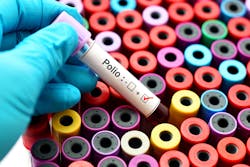United States confirmed as country with circulating vaccine-derived poliovirus
The Centers for Disease Control and Prevention announced that polioviruses found in New York, both from the case of paralytic polio in an unvaccinated adult in Rockland County and in several wastewater samples from communities near the patient’s residence, meet the World Health Organization (WHO)’s criteria for circulating vaccine-derived poliovirus (cVDPV) – meaning that poliovirus continues to be transmitted in Rockland County, NY, and surrounding areas.
CDC is working closely with WHO, the Pan American Health Organization (PAHO), and other international public health partner organizations. As previously reported, the virus’ genetic sequences from the patient from Rockland County, NY, and wastewater specimens collected in New York have been linked to wastewater samples in Jerusalem, Israel, and London, UK, indicating community transmission. The viral sequences from the patient and from three wastewater specimens had enough genetic changes to meet the definition of a vaccine-derived poliovirus (VDPV). These two things – one individual with VDPV and at least one detection of a related VDPV in an environmental sample – meet WHO’s definition of cVDPV, and CDC submitted this data to WHO for inclusion on its list of countries with cVDPV. There are global recommendations for countries with cVDPV2 outbreaks to protect people from polio, and the United States is taking all appropriate actions to prevent new cases of paralysis.
The United States now joins a list of about 30 other countries where cVDPVs have been identified. Circulating vaccine-derived poliovirus occurs when local immunity to poliovirus is low enough to allow prolonged transmission of the original weakened virus in the oral polio vaccine. As the virus circulates and more genetic changes occur, the virus can regain its ability to infect the central nervous system and cause paralysis. It’s important to note that cVDPVs are not caused by a child receiving the polio vaccine. Oral polio vaccine has not been used or licensed in the U.S. since 2000 but continues to be used in some countries.
It’s important to note that no additional cases of polio have been reported in the United States at this time, and this update does not impact the current CDC recommendations for polio vaccination for children or adults.

